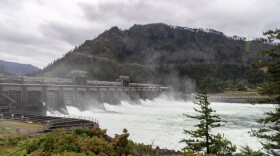Pierce County’s auditor used to get, at most, a handful of requests each year from residents seeking information about elections.
That changed after Nov. 3, 2020, when then-President Donald Trump lost re-election.
Since that Election Day, dozens of requests from residents have poured into the auditor’s office, which oversees voting in the county.
The requesters wanted information about the machines that tabulate votes and the software they use; the names of election workers; a list of voters and the methods they used to vote; images of every ballot scanned in the election; and more.
One request took employees more than 40 hours to fulfill and comprised more than 21,000 pages.
Julie Anderson, Pierce County’s auditor since 2009, soon realized she wasn’t alone. Her counterparts across Washington state, and elsewhere in the U.S., were also buried in requests for records about the 2020 election.
“We're not special,” said Anderson, who is running for secretary of state this year without a party affiliation. “It's a real shotgun blast of record requests.”

Fifteen months after the 2020 election, officials in local and statewide offices continue to labor over records requests from citizen activists who believe the election was stolen or fear that future elections could be tampered with.
It’s one glimpse of the gulf of distrust that has grown among supporters of Trump and his allies toward the local and state elections officials as they prepare for congressional elections in 2022 and a presidential election in 2024.
“I'm worried,” said Paul Gronke, a professor at Reed College in Portland, Oregon, who studies elections. “We are not going in a good direction right now when we have leading members of the Republican Party, one political party, unwilling to publicly accept the validity of a presidential election that was certified,” including in states with Republican governors and election officials.
Trump’s claims of widespread election fraud were rejected by his own attorney general; by Republican governors, who certified results; by Trump-appointed judges, who threw out lawsuits by Trump and his allies; and by a coalition of election officials and industry experts who called the 2020 election the “most secure in American history.” Well over a year later, no evidence for Trump’s claims have emerged.
Loren Culp, a Republican who ran for Washington governor in 2020, also claimed his loss in 2020 was due to widespread fraud. He withdrew a lawsuit alleging fraud a year ago, after the attorney general’s office threatened him with legal penalties for making meritless claims in a court.
Culp is running for Congress this year in central Washington, with Trump’s endorsement.
Trump’s “Big Lie” launched a “Stop the Steal” movement that still reverberates around the U.S. — even in Washington state, which experts say has a national reputation among election officials for well-run voting. Messages encouraging Trump supporters to distrust elections have spread from right-wing media figures and on social media.
"There was a real sea change in 2020, as everyone's well aware of, and part of the response to that has been a coordinated effort to try to get information from elections officials,” Gronke said. “And part of that is using what is a valid way of getting information, which are public records requests.”
State law requires officials to release government records to anyone who asks, with some exceptions for privacy and other factors.
Some of the requests in Washington come from a Pierce County-based group called Citizen Political Action Coalition, or C-PAC. Its members have filed requests to auditors in all 39 Washington counties seeking highly technical information about whether they are complying with state election-security laws.
“I, like everybody else after the 2020 election, was convinced that there was nefarious activities in not states but in counties within the states where the count didn't match up with what was reality,” said Randy Boss, a Gig Harbor resident who helped form C-PAC.
He said he helped create the group in the lead-up to the 2020 election by reaching out to fellow Republican voters via text message, asking if they wanted to help with voter integrity.
C-PAC now has about 10 active members who are focused on exposing gaps in election security in Washington, said Boss, who runs a property management company and ran for the state House of Representatives in 2018 as a Republican.

Boss said he is not convinced by the assurances of elections officials, including Republicans, that the election was secure, nor by the dismissals of lawsuits by Trump and his allies.
“I just kept digging and digging and digging, and I convinced myself that there actually was voter — I don't want to call it fraud — but voter irregularities,” Boss said. “And then I started to think about, ‘Well, if there was voter irregularities across the United States at this level, how are we doing in Washington?’”
Anderson, the Pierce County auditor, said her staff has spent the past year pulling records from archives and putting data together to respond to requests. An employee who works in fiscal administration is supposed to devote about 20 percent of her time to dealing with records requests. But, Anderson said, lately, it’s been 90 to 100 percent of her time.
“It means that team members in fiscal in the auditor's office go without vacation days, cancel vacation, in order to do the work that she would normally be doing or that she would be backing them up to do,” Anderson said.
The trend has hit smaller counties even harder. In Whatcom County, auditor Diana Bradrick said she and her election supervisor often end up pulling the records themselves. The office used to get not even a single election-related records request a year, Bradrick said. Last year, it got about 20.
In Thurston County, auditor Mary Hall said her staff spent 206 hours responding to election-related records requests last year.
“I believe in having government as transparent as possible,” Hall said. “I think where I get a little bothered is when you have requests that are then abandoned.”
Hall said her staff spent 130 hours on records requests that were never picked up.
“But you know, I view it as: It's just part of being a public official and being part of government,” she said.

James Long, a University of Washington assistant professor who studies election security in the U.S. and other countries, said the U.S. has experienced real threats to election security throughout history, and it’s important for people to be able to scrutinize elections.
But, he said, it’s also important to distinguish between doubt that comes from evidence and doubt that’s unfounded.
“What we hope is the standard is such that you don't just investigate an election because somebody just claims that there was cheating,” Long said. “It's exactly like a trial. You can't go to trial without evidence of a crime. So until there's actually evidence produced, I think we have reasons to be skeptical of why this is happening.”
Anderson said she wishes requesters reached out and had conversations with her staff before making requests.
“The frustrating thing for us is that, based on our correspondence with the requesters, it seems clear that they're not election experts,” she said. “They appear to be just smart, engaged citizens who know what they're asking for. But without context and conversation, it's very difficult for them to interpret the records that they get back, which must be very frustrating for them and certainly feels kind of futile to us.”
Anderson’s office received $109,000 in the last county budget to hire a new employee whose job, in part, will be to help respond to records requests.
“We don't think that this is going to go away,” she said. “We think that there is going to be continued curiosity, concerns and activism around elections.”
Auditors who spoke to KNKX said they believed transparency was key to restoring trust among voters who have come to harbor doubts or believe conspiracy theories. They said that meant responding to records requests and inviting skeptical members of the public to view election procedures in person.
But Boss, who helped create C-PAC, has received piles of responses to his requests from across the state, has had conversations with Anderson and has visited Pierce County’s election center — and said all of these experiences left him unsatisfied. When officials have told him there is nothing to see, it’s only made him more suspicious.







